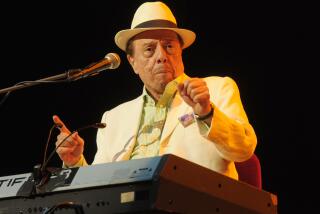Djavan likes to use a bit of everything
Three decades into his musical career, Brazilian superstar Djavan says he’s eager to tackle whatever artistic opportunities the future will bring his way.
“I feel so creative that three decades seem like yesterday,” the singer-composer said, speaking by phone from his home in Rio de Janeiro. “I have so much emotion, motivation. . . I feel all this strength and energy to do more. It’s like I’m always starting.”
Djavan (pronounced Dee-jah-van) has just released his 18th album, “Matizes,” on his own label in Brazil, material from which will be featured in his appearance at the Ford Amphitheatre tonight. The album is a summation of the widely varied genres that the singer has employed over the years, an assortment of styles that includes modern sambas, dance-oriented boleros, Cuban son and even a stab at the blues.
“ ‘Matizes’ [Shades of Color] means to do a little bit of everything, put all the varieties together,” he says. “I really like to have mixtures of funk, samba, flamenco, jazz, bolero, all types of genres that have influenced my life and my type of music.”
--
An early start
Life for Djavan began in Maceio, in Brazil’s northeastern state of Alagoas, where he grew up hearing folk music, listening to his mother sing and teaching himself guitar. At 16, he quit school and his factory job to form a band called Luz, Som e Dimensao (Light, Sound and Dimension), which played Beatles covers and other popular fare at clubs.
A subsequent move to Rio brought him early success recording songs of other artists for television soap operas and singing at popular nightclubs, but it was his composition “Fato Consumado” (Consummated Fact), which won second prize at a music festival in 1975, that brought him recognition in the Brazilian music scene and launched his recording and performing career.
Over the years, Djavan has become widely respected for his eclectic compositional approach, which dovetails samba, bossa nova, American jazz and pop -- his songs often feature complex harmonies, extended melodies and rhythms and textures drawn from unusual mixtures of romantic ballads, jazzy horns and screaming rock guitar. Some of Brazil’s highest-profile musicians, including Gal Costa, Caetano Veloso, Nana Caymmi and Beth Carvalho as well as American stars Al Jarreau, Carmen McRae and the Manhattan Transfer, have covered his songs.
Yet he said that the music of his home village remains his strongest source of inspiration.
“I definitely am a musician of the northeast of Brazil,” he says. “I really have gotten the influence of Luis Gonzaga, the king of forro from Pernambuco. But I was always open to lots of varieties -- the Beatles, classical music, bossa nova, African, jazz and flamenco.
“It’s that fusion mainly of the Beatles and Luis Gonzaga that produces that special harmony.”
--
It’s just human nature
Though “Matizes” does address social issues, Djavan’s material is generally not heavy with topicality, his songs’ lyrics more often inspired by nature and human relationships.
“I need to write when things are at peace, when everything is very calm,” he said. “I need that harmony around me to be able to compose. And when I do, I like to get involved in writing about human nature.”
For his show at the Ford Amphitheatre, Djavan will be backed by a seven-piece band that includes two of his sons, guitarist Max Viana and drummer Joao Viana, both of whom have played with their father for a decade.
He said that the father-son bond makes for a special musical communication as well.
“With my sons, they’re used to my kind of music; growing up they were there all the time next to me,” he says. “Apart from the DNA involved, they have also grown as musicians, so that makes it that much easier. It just comes more naturally to my sons.
“My code of music -- the division of the rhythms and so forth -- is sometimes a little bit difficult for musicians to understand,” he added, with a laugh.
More to Read
The biggest entertainment stories
Get our big stories about Hollywood, film, television, music, arts, culture and more right in your inbox as soon as they publish.
You may occasionally receive promotional content from the Los Angeles Times.










